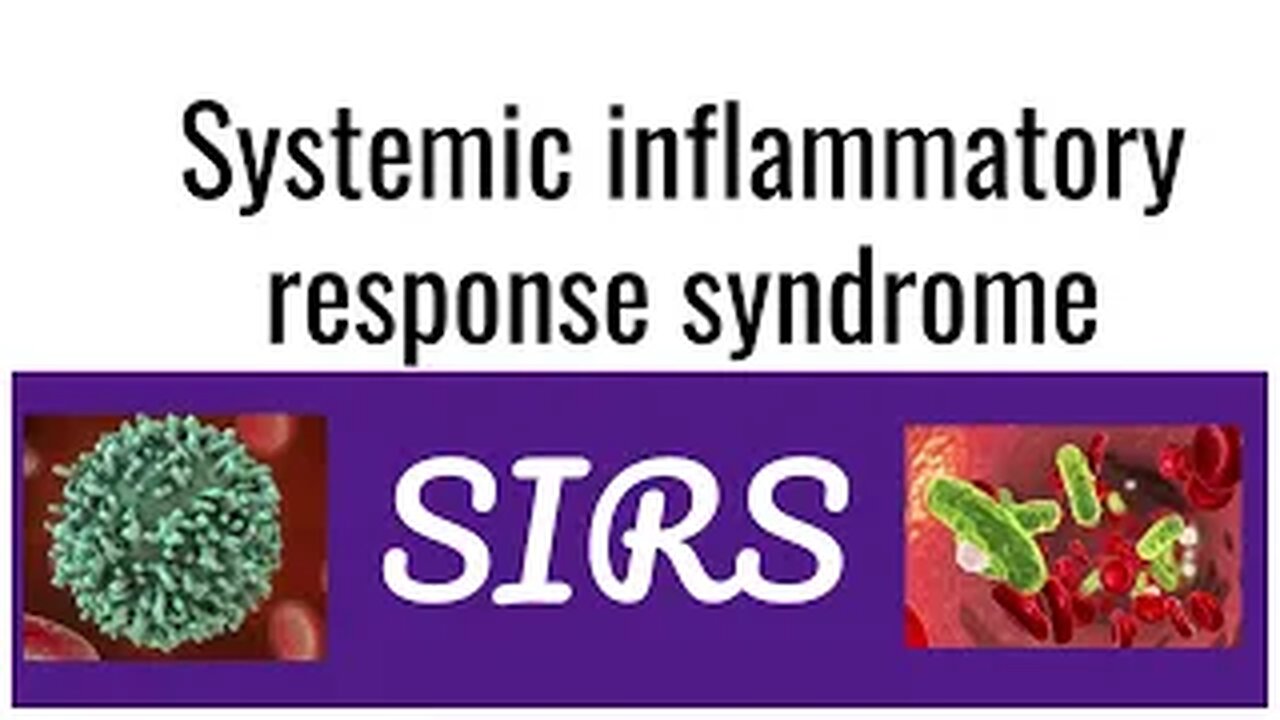Premium Only Content

Systemic Inflammatory Response Syndrome (SIRS) | Causes, Symptoms, Diagnosis, and Management
Systemic Inflammatory Response Syndrome (SIRS) is a serious condition that arises from widespread inflammation throughout the body, which can occur due to various infections, trauma, or other conditions. In this video, we dive deep into SIRS, covering its key characteristics, causes, symptoms, diagnostic criteria, and treatment options. We also discuss how SIRS can lead to sepsis and other severe complications if not managed effectively.
Key Topics Covered:
What is Systemic Inflammatory Response Syndrome (SIRS)?
Definition and overview of SIRS
Pathophysiology and how it affects the body
Causes of SIRS:
Infections (bacterial, viral, fungal)
Trauma or surgery
Burns
Pancreatitis
Hemorrhagic shock
Major organ failure
Criteria for Diagnosing SIRS:
The 4 cardinal signs of SIRS:
Abnormal temperature (fever or hypothermia)
Tachycardia (heart rate 90 bpm)
Tachypnea (respiratory rate 20 breaths/min or PaCO2 32 mmHg)
Abnormal white blood cell count (leukocytosis or leukopenia)
Symptoms of SIRS:
Fever or low body temperature
Increased heart rate
Rapid breathing
Altered white blood cell count
Organ dysfunction (e.g., kidney failure, liver failure)
SIRS vs. Sepsis:
Key differences between SIRS and Sepsis
Progression of SIRS into sepsis and septic shock
Diagnosis and Tests:
Blood tests (WBC count, cultures)
Imaging (for detecting infections or other causes)
Organ function tests (renal, hepatic, respiratory)
Management and Treatment:
Supportive care (fluid resuscitation, oxygen support)
Antibiotic therapy for infections
Addressing the underlying cause (surgical intervention for trauma or infection)
Monitoring for complications such as septic shock and multi-organ failure
Prognosis and Complications:
How early detection and treatment impact outcomes
Potential complications of untreated SIRS
Tags:
systemic inflammatory response syndrome, SIRS, causes of SIRS, symptoms of SIRS, diagnosing SIRS, sepsis, sepsis vs SIRS, SIRS management, inflammatory response, SIRS treatment, tachycardia, fever, trauma, infection, pancreatitis, burns, organ failure, septic shock, multi-organ failure, medical emergency, clinical guidelines
SIRS with a suspected source of infection is termed sepsis.
Sepsis with one or more end-organ failures is called severe sepsis
Severe sepsis with hemodynamic instability despite intravascular volume repletion is called septic shock.
#medicine #icu #sepsisawareness
There is also a term called multiple organ dysfunction syndrome (MODS)
Novice medic creates these videos for novice medics like himself who want to understand even the basic concept of medical field.
One thing that I have learnt is that no matter how much we try no medic can call himself an expert as the world is evolving day by day. So we will always be novice medics and novice medics should always stick together for the evolution of knowledge .
-
 LIVE
LIVE
Major League Fishing
2 days agoLIVE Tackle Warehouse Invitationals, Stop 1, Day 2
569 watching -
 LIVE
LIVE
I_Came_With_Fire_Podcast
10 hours agoNOC Spy: CIA uses SATANIC RITUAL ABUSE to make SLEEPER Cells
423 watching -
 28:42
28:42
CatfishedOnline
1 day ago $0.85 earnedWoman Insists Morgan Wallen Relationship Isn't a Romance Scam!
6.98K -
 16:25
16:25
TSPLY
23 hours agoNew CNN / MSNBC Meltdown Moments Of Getting Mad At Donald Trump In February
12.8K9 -
 8:33
8:33
scoutthedoggie
3 hours agoAirsoft War Games Scotland
7.58K2 -
 4:56
4:56
Kirill MultitoolOfficial
1 day ago $0.67 earnedSurvival TIPS and usefull bushcraft DIY in the wild
15K3 -
 27:25
27:25
ArturRehi
1 day agoThis is How Dictatorships are Formed
8.13K3 -
 59:35
59:35
AlaskanBallistics
16 hours ago $0.45 earnedI Love this Gun Episode # 11
6.19K1 -
 1:21:01
1:21:01
BibleUnbound
19 hours agoThe Complete Story of Moses: The Man of God
12.8K3 -
 15:56
15:56
Chris From The 740
7 hours ago $0.01 earnedFenix LR36R Review: The Most Powerful Light I've Ever Tested!
6.9K1